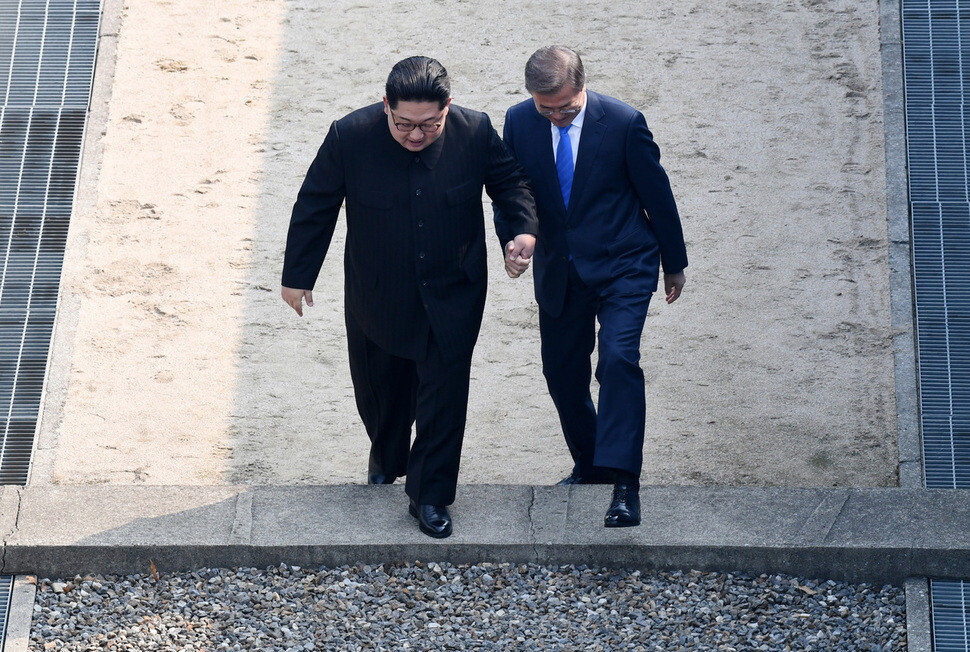hankyoreh
Links to other country sites 다른 나라 사이트 링크
[Editorial] Pyongyang should embrace Seoul’s inter-Korean efforts on COVID-19 and humanitarian issues

Apr. 27 marks the second anniversary of the Panmunjom Declaration for Peace, Prosperity, and Unification of the Korean Peninsula. At 9:30 am on Apr. 27, 2018, South Korean President Moon Jae-in and North Korean leader Kim Jong-un stepped over the Military Demarcation Line (MDL), hand in hand, in what could have been a scene from a movie. In the declaration they made that day, the two leaders said, “There will be no more war on the Korean Peninsula and thus a new era of peace has begun.” The signing was followed by negotiations and dialogue on a range of topics, including meetings between high-ranking officials, from the two sides. That September, Moon visited Pyongyang.
While there had been hopes that spring had come to the Korean Peninsula at last, the division of the peninsula and the conflict that had lasted for more than 70 years — throughout the Cold War and into the present — ultimately proved to be insurmountable. Ever since their unproductive summit in Hanoi in February 2019, the US and North Korea have failed to narrow their differences, with the US demanding denuclearization and the North demanding incentives. The deadlock in North Korea-US dialogue has brought a corresponding chill in inter-Korean relations, since both South and North Korea have placed the success of North Korea-US dialogue over inter-Korean relations.
The South Korean government explained that a breakthrough in North Korea-US dialogue would open the gates for inter-Korean relations. But domestic and international experts and leaders of civil society have continued to criticize Seoul for essentially twiddling its thumbs as it waits for progress in North Korea-US dialogue. At the beginning of the year, the government’s stance shifted. That was reflected in South Korean President Moon Jae-in’s New Year’s address on Jan. 14, in which he said that Seoul would “broaden its cooperative relationship with North Korea as much as possible instead of just observing North Korea-US dialogue.” After that, the government suggested allowing individual tourism to North Korea as a creative solution to the issue of the Mt. Kumgang tourism resort, but the coronavirus outbreak occurred immediately afterward.
Both South and North Korea have been so focused on combating COVID-19 that they haven’t had a chance to worry about inter-Korean relations. In recent days, there have even been rumors that North Korean leader Kim Jong-un has a serious health condition. Practically speaking, there’s unlikely to be progress on North Korea-US dialogue before the US presidential election in November.
While it’s a troubling and uncertain time on the Korean Peninsula, that’s all the more reason for the South Korean government to take ownership and be proactive about improving inter-Korean relations. We mustn’t allow inter-Korean relations to become subordinate to the North Korea-US talks. That’s why the event the government has organized at Jejin Station, Goseong County, Gangwon Province, on Apr. 27 (the second anniversary of the Panmunjom Declaration) to celebrate efforts to finish the northern section of the Donghae (East Sea) Line is so significant. It shows that the government intends to energetically get to work, starting with what it’s capable of doing right now.
Even if the North Koreans have their reasons for being unhappy with the South, they ought to adopt a forward-looking attitude on responding to the COVID-19 outbreak and on humanitarian issues, such as arranging reunions for families divided by the Korean War. Two years ago, the leaders of South and North Korea declared before 80 million Koreans and the whole world that improving and developing inter-Korean relations is the steadfast desire of the whole nation and an urgent demand of our time, a demand that cannot be deferred any longer.
Please direct comments or questions to [english@hani.co.kr]

Editorial・opinion
![[Column] Life on our Trisolaris [Column] Life on our Trisolaris](https://flexible.img.hani.co.kr/flexible/normal/500/300/imgdb/original/2024/0505/4817148682278544.jpg) [Column] Life on our Trisolaris
[Column] Life on our Trisolaris![[Editorial] Penalties for airing allegations against Korea’s first lady endanger free press [Editorial] Penalties for airing allegations against Korea’s first lady endanger free press](https://flexible.img.hani.co.kr/flexible/normal/500/300/imgdb/original/2024/0502/1817146398095106.jpg) [Editorial] Penalties for airing allegations against Korea’s first lady endanger free press
[Editorial] Penalties for airing allegations against Korea’s first lady endanger free press- [Editorial] Yoon must halt procurement of SM-3 interceptor missiles
- [Guest essay] Maybe Korea’s rapid population decline is an opportunity, not a crisis
- [Column] Can Yoon steer diplomacy with Russia, China back on track?
- [Column] Season 2 of special prosecutor probe may be coming to Korea soon
- [Column] Park Geun-hye déjà vu in Yoon Suk-yeol
- [Editorial] New weight of N. Korea’s nuclear threats makes dialogue all the more urgent
- [Guest essay] The real reason Korea’s new right wants to dub Rhee a founding father
- [Column] ‘Choson’: Is it time we start referring to N. Korea in its own terms?
Most viewed articles
- 160% of young Koreans see no need to have kids after marriage
- 2[Column] Life on our Trisolaris
- 3[Reporter’s notebook] In Min’s world, she’s the artist — and NewJeans is her art
- 4Hybe-Ador dispute shines light on pervasive issues behind K-pop’s tidy facade
- 5[Editorial] Penalties for airing allegations against Korea’s first lady endanger free press
- 6Presidential office warns of veto in response to opposition passing special counsel probe act
- 7Vietnamese war victims speak of sexual violence by S. Korean troops for the first time
- 8S. Korea discusses participation in defense development with AUKUS alliance
- 9Japan says it’s not pressuring Naver to sell Line, but Korean insiders say otherwise
- 10Months and months of overdue wages are pushing migrant workers in Korea into debt